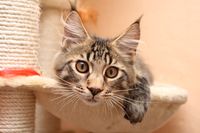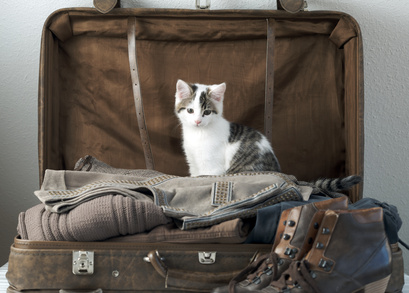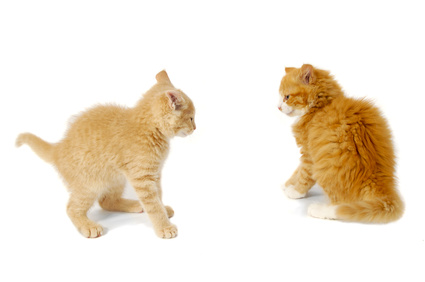Urinary uncleanliness linked to the environment of the cat
 The cat is a so-called species territorial. It attaches enormous importance to its living environment he will separate into various areas : a playground, an area of isolation (where the animal must be able to remain quiet, avoid contact), a dedicated to his meals or a aire elimination where it will make its needs.
The cat is a so-called species territorial. It attaches enormous importance to its living environment he will separate into various areas : a playground, an area of isolation (where the animal must be able to remain quiet, avoid contact), a dedicated to his meals or a aire elimination where it will make its needs.
any changes, any item that the cat is considered disruptive in "his space" will enormously upset and can trigger the onset of uncleanliness.
Dirtiness associated with a problem with litter
In some cases, the proposed litter is not suitable cat and he refuses to do there needs.
It may not appreciate :
– The litter bin has (some cats hate, for example, closed litter boxes, poorly ventilated, where the ammonia smell is much stronger)
– The substratum therein (avoid perfumed substrates unappreciated by some animals)
– The location Litter : Cats do not like to relieve themselves in a place too close to their place of rest and the place of their meals.
Similarly, they often dread too noisy or traffic areas (be avoided for example the proximity of a washing machine…)
Finally, litter must be permanently accessible (do not choose a room with the doors closed part of the day)
– The lack of cleanliness : some animals will remain clean if their bedding is changed frequently.
⇒ The concerns of dirt can then be solved by a change of the substrate or litter bin, strict hygiene or reorganization of space by placing the tray in a quiet location, little way, away from the basket and bowl (in very small areas, spaces in height may be developed to clearly separate these different elements)
Dirtiness associated with an aversion to the litter
Sometimes, a perfectly clean cat until, seems suddenly no longer want to do in his litter.
A specific cause, one event that could disturbing the cat must be sought.
Various injuries can occur while the cat urine and encourage them to avoid at all costs litter for fear of this event breed :
– loud noise (slamming door, explosion…)
– Aggression by another animal (dog, another house cat…)
– very noisy children came the upset as he made his needs
– Pain (a cat with a history of cystitis may associate the pain litter tray felt when urinating and not wanting to return)
– Punishment (it is sometimes tempting when the cat poops out of the litter to take him by force to tray to show him "where he would". In reality, the cat has just that when punished, placed it in his litter, hence his desire to not go…)
⇒ To try to remove this recent aversion to the litter, small changes will be made:
– A new tray and a new location will allow to remove this phobia litter.
– Litter will be, There still, placed in a quiet place, hidden and inaccessible to young children if they are causing the problem.
– The punishments will be decided (they only increase the anguish of cat and uncleanliness)
Uncleanliness associated with a change environment
As we mentioned previously, the cat is very attached to his habits, in its territory and any change "his space" can disrupt.
It can then seek reassurance in réapposant its brands in various parts of the house, including through the urine marking
(see article "What a difference between eradication and urine marking ?”)
A "anxiety deterritorialisation" may occur following any disruption to the organization of the cat's territory :
– after Repair Work,
– After a simple Redevelopment Space with furniture up change (some cats sometimes have the uncleanliness after moving to a single cabinet!)
– Next to a move
Other signs are so often associated with uncleanliness :
The cat made great brands griffade on walls or furniture and facial marking is modified (he does rubs more on housing furniture as he did previously or, on the contrary, spends time rubbing everywhere)
These behavioral changes reveal the "malaise" of the cat
⇒ This type of dirt can be prevented by the use of pheromones appeasement applied in new home a few days before the removal :
Facial Pheromones are chemicals emitted by the cat to locate and communicate with other dogs.
It deposits these substances, rubbing his cheeks on various objects in the environment. Surfaces and “marked” become familiar and soothing for the animal.
These pheromones have been artificially reproduced and can be used as a spray or diffuser to help decrease anxiety cat face any stressful situation for him (consult your veterinarian)
These same pheromones can be used to treat a urinary marking appeared after work.
Of food supplements with soothing can also be proposed (L-theanine or tryptic hydrolyzate of casein αS1). They are easy to administer (powder or tablets palatable), have no side effects and do not cause sedation.
Uncleanliness linked to the arrival of a new factory
The arrival of a newcomer can, just as a move or a reorganization of space, be an element from disturbing the "little habits" cat and instil in him great anxiety and the appearance of uncleanliness…
The new factory can be either a human (for example one or a small(e) which(e) came(e) move home…), another animal (dog, CAT)
Thus, a master who has just adopted a second cat to avoid its first animal is bored may be very surprised to see his cat to urinate anywhere.
In reality, it is sometimes much more perturbed than happy about the arrival of this newcomer will oblige to share and therefore reorganize its territory.
This is called "toanxiety cohabitation”
These cohabitation disorders may even appear in cats having previously lived together without problems following a change (for example at puberty one of two cats, after maternity, the return of a fugue of one of the animals…)
Usually, the arrival of new cat, the two animals "are discovered" relatively violently: They shout, feulent, looking to impress each other…
These attacks disappear if the animals manage to divide the territory.
When this distribution has not been performed correctly, attacks continue, becoming increasingly violent and are caused by each intrusion of a cat in a territory "unallocated".
One of the two animals said "active" continuously assaulted the second cat called "passive".
In more advanced stages of the conflict, active cat is obsessed with the second cat, monitoring the lesser of movement. The latter then saw recluse under a bed or furniture, not daring to move.
Uncleanliness can then relate the two cats :
liabilities cat did not even dare go up litter for fear of being attacked,
while the active chat, completely obsessed, develops great anxiety responsible for urinary marking and disposal in inappropriate places.
⇒ To avoid uncleanliness linked to cohabitation anxiety, It should be:
– Do not intervene during the attack early days.
It is very tempting to try to give each cat a specific space and separate them to limit the "fights". But the separation of the two animals will help to distribute them properly space and worsen dramatically assaults.
It should be , on the contrary, let them do, while allowing them maximum space available (avoiding close doors)
– The use of pheromones say familiarization and healing can help calm anxiety cats associated with this new situation, as the administration of nutritional supplements with soothing
– It is necessary to, Furthermore, propose a litter every cat (even a litter more than the number of cats) and have these bins in a variety of places to help each animal is assigned a disposal area.
– When attacks have already taken far bigger, only the establishment of a medical treatment will calm the anxieties of each animal and do away, not only, uncleanliness but all other signs of anxiety two cats (aggression vis-a-vis the other animal, aggression toward owners, eating disorders, incessant licking…)
your veterinarian consider with you the best treatment possible function des observed signs (molecules such as selegiline or clomipramine may notably be used)
Uncleanliness and depression
 When great anxiety, occurred following a change in the cat's living environment, is not identified early enough, it can progress to a depressed state :
When great anxiety, occurred following a change in the cat's living environment, is not identified early enough, it can progress to a depressed state :
The cat becomes indifferent to all that surrounds it, he suffers from sleep disorders, develops anorexia or conversely bulimia, it may start to meow reasons, spends all her time grooming…
To these many symptoms can add dirtiness : the cat begins to make its needs any where. In cases of serious chronic depression, he is so depressed, demotivated, it goes up litter and made where it is or even where he sleeps.
Drug therapy will, There still, be set up by your veterinarian.
The use of pheromones and food supplements may improve depressive disorders, as the introduction of time games Of the cat with its owner (establishment of hunting games (mobiles, mouse shaped toy…) and exploration games (cartons drilled, paper bags and all sorts of hiding places)) for maximum boost.
Avoid…
Faced with a problem of uncleanliness, whatever its origin, avoid :
– From clean dirt with thebleach or a ammonia product :
cats love these odors and this will encourage them to repeat the same place.
These cleaners will by used for cleaning against litter to make it more attractive
– From let all Mark olfactory or visual to the stained area (encourage these brands, There still, the cat to urinate again in this place) :
A cleaning urinary spots with carbonated water (type Perrier) and diluted white vinegar helps remove much urine odors.
– From keep appealing one new place chosen by the cat to pursue his urine.
If the cat has made a habit of doing a special place, we must try to make this very unpleasant place :
for example sheets of paper laminated,aluminum or survival blankets may be placed on the comforters or rugs (the cat will then find the much less fluffy and will wet legs if urine above, he does not appreciate!)
Water may be placed at the bottom of the tub or shower pan, to prevent the cat urinate go there…
– Punishments :
Any cat punishment should definitely be banned because it only increases stress and consequently its dirtiness. A real vicious circle then established with a very rapid deterioration of relations between the animal and its owners.
§
Uncleanliness in cats is very often associated with a disturbance of its environment and frequently caused by an anxiety state.
Feel free to bring your veterinary any dirt problem occurred recently in your pet tell him although the circumstances of occurrence of these "accidents". Indeed, more support of this type of disorder is late, more events that could trigger uncleanliness will be difficult to remember and prognosis reserved.


